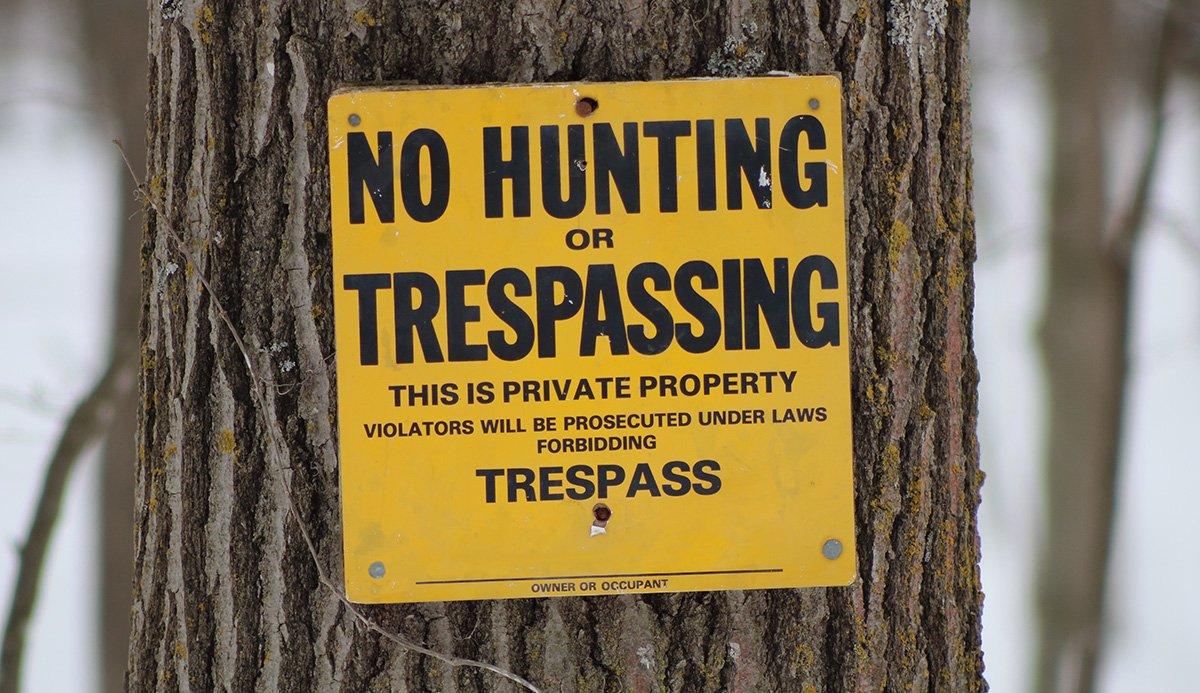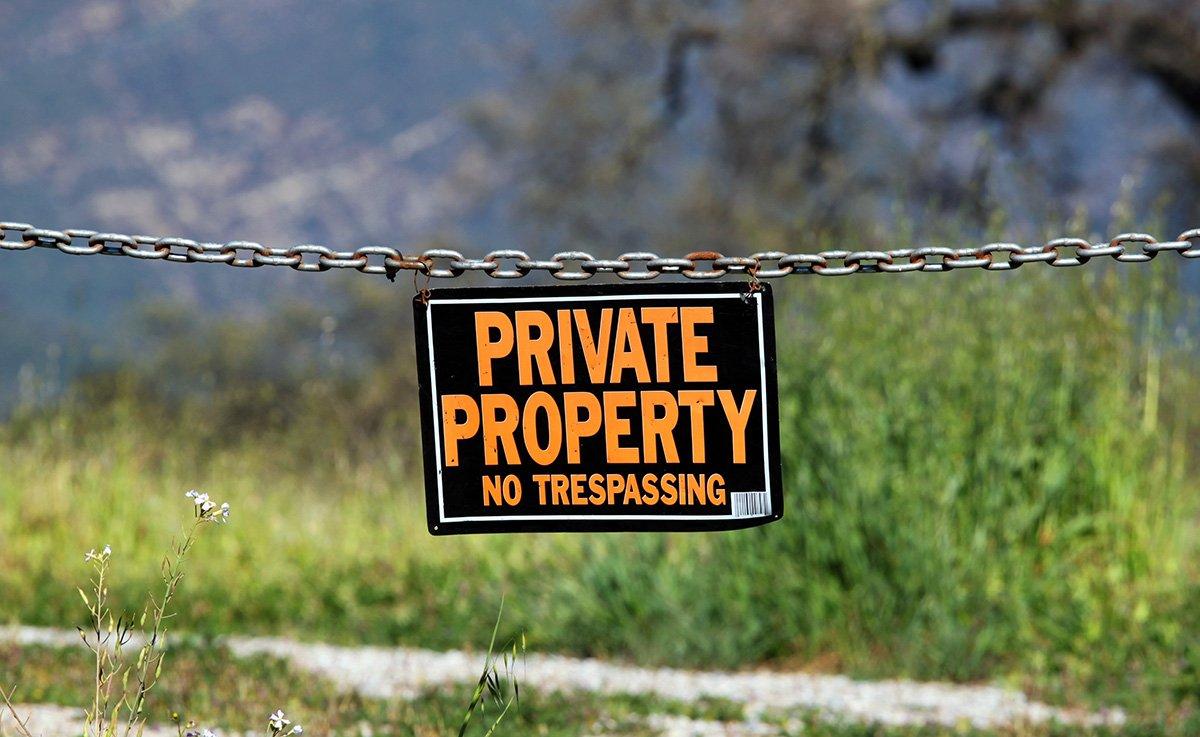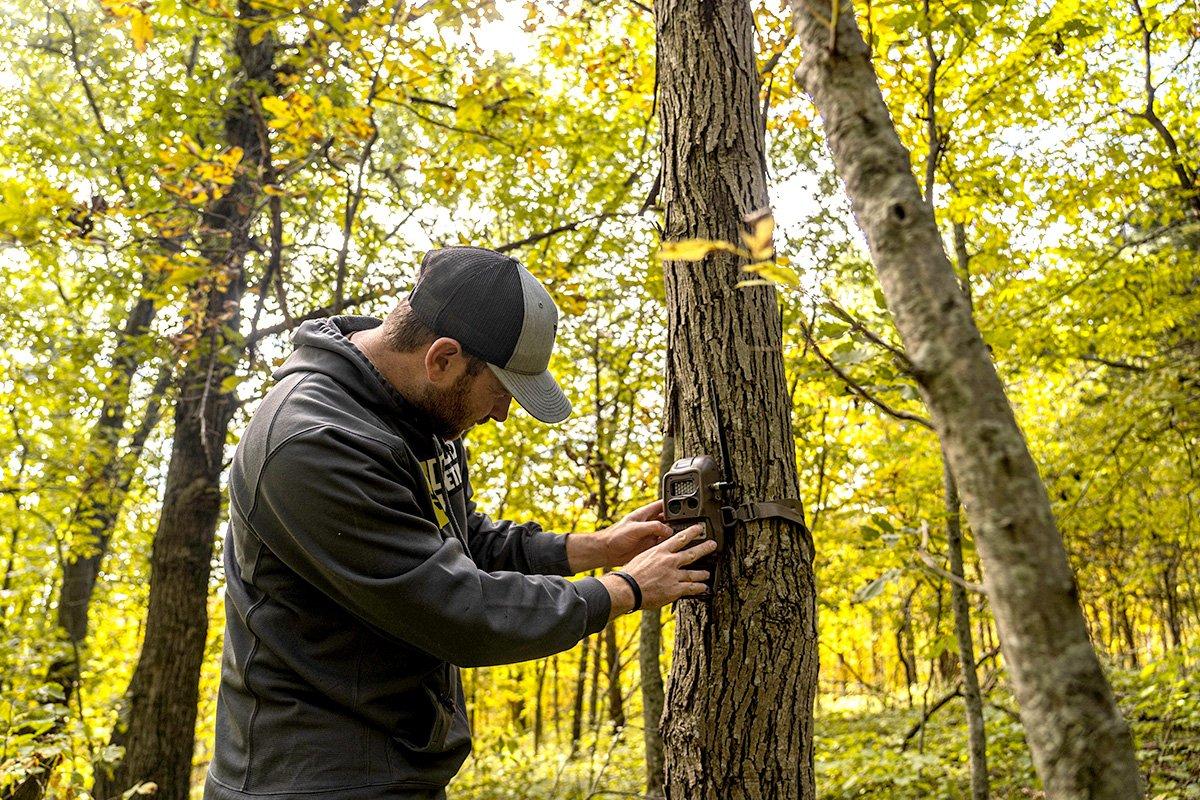Thieves, poachers and vandals are a problem on many hunting properties. We asked a fish and wildlife conservation officer for his advice on dealing with it
Two years ago, a trespasser tried to kill me. While checking treestands, I noticed someone had tampered with a climbing stand that I'd strapped permanently to a tree. Originally, the climbing cables were attached, and a ratchet strap added further stability on the top and bottom sections. It wasn't going anywhere. Or at least, that's what I thought when I hung it.
But a trespasser had taken the climbing cables. They also opened and loosened the ratchet straps just enough the stand stayed in place but would fall to the ground with the slightest bit of pressure on the platform. In Kentucky, that's wanton endangerment in the first degree - a class D felony.
That was the worst of it, but authorities never caught the culprit. I still had to contend with stolen trail cameras and other violations. So, I did my homework on how to prevent trespassing, and consulted with Brad Bowles, a former Kentucky state trooper and current Kentucky Department of Fish and Wildlife Resources conservation officer. Here's what he had to say.
Take it Seriously
Even in an age where trail cameras and extensive property surveillance abound, trespassing is still a widespread issue. Sometimes the result is just stolen trail cameras, but other times, it can lead to things more serious.
One very hot July, I was contacted by a landowner who located a subject actively deer hunting from a shooting house on his property, Bowles says. The landowner had been seeing evidence of trespassing activity and suspected someone was hunting on his property. The landowner rigged all the doors of his box blinds with a piece of string. If the door was opened, the string would fall, indicating someone had accessed the door.
One day, the landowner decided to patrol his property. The string was missing from the box blind door.
He opened the door, and immediately was face-to-face with a subject armed with a loaded .270-caliber rifle, Bowles says. The landowner held the subject at gunpoint until a deputy and I arrived on scene. I arrested the subject.
After further investigation, the authorities located a campsite and evidence of several deer having been taken out of season. Unfortunately, such behavior is a more common occurrence than we often realize, and often much harder to prove.
Proceed with Caution
Despite the outrage, there are certain things landowners should not do to prevent and discourage trespassing.
Most importantly, it's best not to do what the landowner in the example above did, Bowles says. Taking actions into your own hands with an armed subject trespassing on your property could be very dangerous. Law enforcement officers - and particularly game wardens - are specially trained to handle these situations. Call law enforcement as soon as you witness the violation. Then, just try to maintain vigilant watch on their location and conduct.
While camera traps are good, other types are not. In fact, you could become liable if someone falls victim to a trap.
It's best not to construct any type of devices to "booby-trap" persons trespassing, Bowles says. Hidden boards with large barn nails hidden on access roads to deflate tires is just one example I've run across. You're likely to flatten the tires of the suspects, but in turn, what could they do to retaliate before they are caught, or law enforcement arrives? You're the victim of trespassing. Why do anything to injure the criminal that could make them look like a victim?
Call law enforcement instead. Obtain registration plate numbers, and if you must confront a trespasser, don't be hostile.
Tips for Deterring Trespassers
While it might seem to be an impossible problem, there are still ways to discourage trespassers.
Establish Relationships: Most trespassing problems stem from neighboring landowners or hunters. Talk to them before it ever becomes an issue. Be proactive. Be courteous. And if they're flat-out scum, make it clear that you carefully watch your property.
Be Quiet: Co-ops are good if all parties are trustworthy. But keep your mouth shut about big deer, especially if you have a crappy neighbor. Temptation only increases the likelihood of trespassing.
Post the Property: The next step is plastering property lines with no-trespassing signs. In some states, this is required to legally keep people out. Some states even require signs to be posted at a certain frequency (e.g. every 50 feet) to create a legal barrier to entry.
The signage needs to be very visible and is probably best placed higher off the ground than what a person can stretch to reach. Bowles says. Signs are frequently torn down.
Fence Property Lines: A good fence is expensive, but helpful if you want to keep people out. If people have to climb over or cut through a tight, six-strand barbed wire to trespass, they're less likely to do it, especially if they're in a vehicle or ATV.
Locked and Lit: Once the fence is up, put in metal gates and chain them to 6x6 posts. Bowles recommends locking gates and adding motion lights to any buildings on the property.
Create Other Physical and Visual Barriers: Fencing aside, creating other barriers is a good idea. In open areas, plant cedar trees along your side of the fence. Space them about 15 feet apart. This adds another layer of defense, and once trees mature, they'll block views and prevent vehicle traffic. In timber, hinge-cut trees along the property line and fell them parallel to the fence.
Post Trail Cameras: Next, use some of your cameras to monitor likely access points onto your property.
Trail cameras in inconspicuous places are always a plus, Bowles says. Even if we don't catch a person actively trespassing on the property, a captured image and identification can lead to prosecution. We work many cases like this and after identifying the suspect trespassing, we obtain a criminal summons for them. Often, these investigations lead to numerous other wildlife violations - no permits to hunt, untagged game, etc.
Patrol: Don't forget to take a stroll every now and then. Sometimes, be obvious about it. Let neighbors see you doing it.
Again, the aim is to deter persons from coming onto the property, Bowles says. Trespassers don't want to be caught, so if they think it's a property that's frequented by the landowner, they are less likely to trespass.
Don't Be Predictable: Other times, go incognito. But don't be so sneaky that people think you're never there.
Maintain the property and make it look like you are accessing the place on a regular basis, Bowles says. Old signs and grown-up areas around barns and access roads make trespassers think you're seldom there. Our biggest trespass complaints come from absentee landowners and land that's not maintained.
Know Your Game Warden: I'm approached often with, 'Yea, I caught a guy trespassing on my property last week, but I didn't know who to call or how to get in touch with you.' Bowles says. Bottom line? Game wardens want you to call and report trespassing activity. Trespassing often leads to numerous other wildlife violations. But we can't help if we're not called. Make sure you have the game warden's number in your phone.
If you don't know who to call, or can't reach an officer directly, contact a dispatch center.
Collect Evidence: Collect any clues you find that point to trespassing, and turn them over to a game warden. Keep a log of the dates and times of any issues. And if you see someone trespassing, pull out your cell phone and record it.
Follow Through: Lastly, show them you aren't messing around.
The biggest frustration game wardens have is when a landowner calls to report a trespasser, only to decide not to prosecute them after we've worked hard to catch them, Bowles says. If the landowner just wants to warn them, they are capable of doing that themselves. There simply aren't enough of us to respond to every trespass complaint if the landowner doesn't want any enforcement action taken.
So, if and when trespassing occurs on your property, make sure you know how you'll handle the situation.
Don't Miss: 8 Weird and Wacky Hunting Laws
Check out more stories, videos and educational how-to's on deer hunting.










